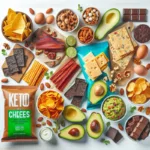Detroit Athletic Club Launches Kosher Kitchen: A New Era for Food Safety, Dietary Preferences, and Smart Food Choices
“When my daughter broke out in hives after eating pasta at a local club, I realized how challenging it is to find safe, clearly labeled options for families with food sensitivities. That’s why the Detroit Athletic Club’s new kosher kitchen is such a game-changer.” — Sarah, Michigan parent
Detroit Athletic Club’s Kosher Kitchen: Raising the Bar for Inclusive Dining
The Detroit Athletic Club (DAC) has introduced a fully kosher kitchen under Orthodox supervision, setting a new standard for inclusive, transparent, and safe dining in the Midwest. This initiative, covered in The Jewish News, is more than a nod to tradition—it’s a leap forward for anyone who cares about food safety, allergen management, and ethical eating.
Why Kosher Kitchens Matter for Food Safety and Dietary Needs
- Strict Ingredient Control: Kosher certification requires rigorous oversight of ingredients and preparation, reducing cross-contamination risks for allergens like nuts, dairy, and gluten.[1]
- Transparent Labeling: Kosher kitchens must document every ingredient and process, which aligns with best practices for allergen disclosure and food safety.
- Ethical and Religious Assurance: Orthodox supervision ensures compliance with religious dietary laws, giving peace of mind to observant families and those seeking ethically sourced food.
Food Safety Alerts & Dietary News: What’s Changing in 2024–2025?
| Topic | Recent News | Impact on Consumers |
|---|---|---|
| Food Recalls | FDA Recall Alerts | Stay updated on contamination risks (e.g., salmonella in spices, undeclared allergens in snacks). |
| Labeling Laws | FDA’s New Labeling Rules | Stricter allergen disclosure and clearer ingredient lists help consumers make safer choices. |
| Emerging Food Trends | NYT: Plant-Based Foods | Growth in plant-based, keto, and allergen-free options supports diverse dietary needs. |
| Brand Updates | Food Dive: Red Dye 3 Bans | Brands are reformulating to remove banned ingredients, improving safety for sensitive consumers. |
How Food Scan Genius Empowers Smart Food Choices
Food Scan Genius is designed for people who need to know exactly what’s in their food—whether for allergies, religious observance, or ethical reasons. The app allows users to:
- Scan product barcodes to instantly check for allergens, kosher/halal status, and ingredient origins.
- Compare products based on dietary preferences—vegan, gluten-free, nut-free, and more.
- Receive real-time alerts about recalls, ingredient changes, and new regulations.
User testimonial: “With Food Scan Genius, I can scan any snack or meal—even at clubs like the DAC—and know immediately if it’s safe for my son’s allergies and fits our kosher lifestyle. It’s a lifesaver!” — Rachel, Detroit
Download Food Scan Genius to simplify your food choices today.
Labeling Laws: US vs EU—What You Need to Know
| Region | Authority | Key Labeling Rules |
|---|---|---|
| United States | FDA |
|
| European Union | EFSA |
|
FAQs: Kosher Kitchens, Food Safety, and Smart Choices
What makes a kosher kitchen safer for people with food allergies?
Kosher kitchens follow strict protocols for ingredient sourcing, separation, and cleaning, reducing cross-contact risks for allergens.[3]
How can I stay updated on food recalls and ingredient changes?
Use apps like Food Scan Genius or visit the FDA recall page for real-time alerts.
What’s the difference between US and EU food labeling laws?
The EU requires disclosure of more allergens and stricter ingredient origin labeling compared to the US, offering broader protection for consumers with sensitivities.
Conclusion: Making Food Safer, Smarter, and More Inclusive
For families like Sarah’s, the Detroit Athletic Club’s kosher kitchen is more than a culinary milestone—it’s a lifeline for safe, transparent, and ethical eating. By understanding ingredient lists, staying informed on food safety alerts, and using tools like Food Scan Genius, everyone can enjoy meals with confidence—no matter their dietary needs or values.
References:
[1] FDA: Food Allergies
[2] EFSA: Food Allergens
[3] PubMed: Kosher Certification and Allergen Control
News: The Jewish News, FoodNavigator-USA, NYT: Plant-Based Foods





